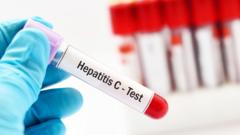Summary
GP practices in England will help identify people affected by the contaminated blood scandal by offering hepatitis C tests to anyone who received a blood transfusion before 1996. The program aims to find and treat those unknowingly infected due to blood transfusions during the 1970s to 1990s.
Key Facts
- The contaminated blood scandal involved blood transfusions that exposed thousands to hepatitis C in the UK during the 1970s, 80s, and 90s.
- Patients signing up with a GP (general practitioner) will be asked about past blood transfusions and offered a hepatitis C test if necessary.
- Up to 400,000 people annually, born before 1996, will be asked about their transfusion history during GP registration.
- The Infected Blood Inquiry report recommended this proactive testing approach.
- Hepatitis C can cause severe liver damage if undetected, but modern drugs can treat it effectively.
- Many victims of the contaminated blood were haemophiliacs, and over 3,000 people have died from related infections, including HIV.
- Maureen Arkley, a victim of the scandal, was diagnosed with hepatitis C in 2023, 47 years after receiving tainted blood.
- The charity Hepatitis C Trust is encouraging testing for anyone who had a blood transfusion before 1996.
